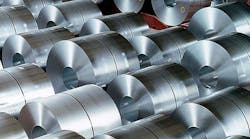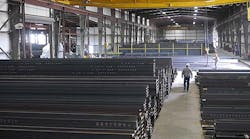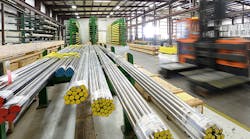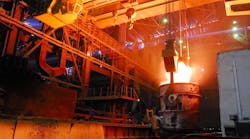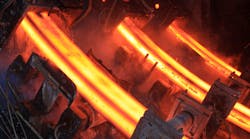The Metals Service Center Institute (MSCI) supports the domestic steel industry’s petition for tighter import restrictions, and this in contrast to other steel-consuming industries arguing that tariffs would lead to job losses in the steel supply chain. But, MSCI also agrees that the steel-consuming trade associations that global trade benefits manufacturers in the supply chain, and advised the Trump administration to craft trade rules it characterized as an “upgraded” NAFTA regimen.
“NAFTA can be improved, there is no doubt,” MSCI president and CEO M. Robert Weidner III stated in written testimony, submitted to the U.S. Dept. of Commerce as part of its evaluation of a Section 232 ruling on imports of flat-rolled steel. “But trade with Canada and Mexico is not why U.S. steel and aluminum shipments have not recovered to their pre-Great Recession peak.
“The blame for that lies with global state-subsidized overcapacity and other unfair trade practices by bad actors like China. The Trump administration must be fully aware of this trade dynamic so that it can work collaboratively with Canadian and Mexican officials to improve NAFTA for the entire North American industrial metals supply chain.”
MSCI testified that NAFTA might be modernized and improved by:
• “Ensuring stronger and more transparent rules that continue to level the North American trade playing field;
• Easing border crossing regulations, wait times, and other restrictions;
• Harnessing the digital revolution to allow for faster, easier, less burdensome and safer cross-border commerce;
• Creating even stronger, more efficient dispute settlement procedures; and renewing the commitment to work collaboratively, while strengthening the rules and mechanisms to hold accountable bad actors that seek to circumvent trade laws.”
The Commerce Dept. is investigating domestic steelmakers’ complaints of dumping by foreign competitors, principally Chinese steel producers. The “Section 232” investigation followed an April decision by the federal International Trade Commission in favor of a request by U.S. Steel Corp. and other domestic producers to investigate claims that Chinese steelmakers colluded to fix prices, below U.S. market levels.
The National Tooling and Machining Assn. and the Precision Metalforming Assn., both trade groups representing steel-consuming segments of U.S. manufacturing, have urged the administration to consider “downstream” effects on manufacturing employment if steel costs rise as a result of tariffs being evaluated now.
For its part, MSCI testified that, “the health of the U.S. domestic steel industry is critical to the entire U.S. manufacturing sector and the broader U.S. economy. Problems posed by foreign government-sponsored capacity expansion demand response from the U.S. government.”
But, regarding NAFTA, MSCI noted that in 2015 about 48% of U.S. manufactured goods imports from Canada and 40% of U.S. manufactured goods imports from Mexico were categorized as intermediate goods, parts, and components. It emphasized that in these intermediate goods “have helped manufacturers in the United States improve their global competitiveness and grow domestic manufacturing with end products sold both in the United States and overseas.”
